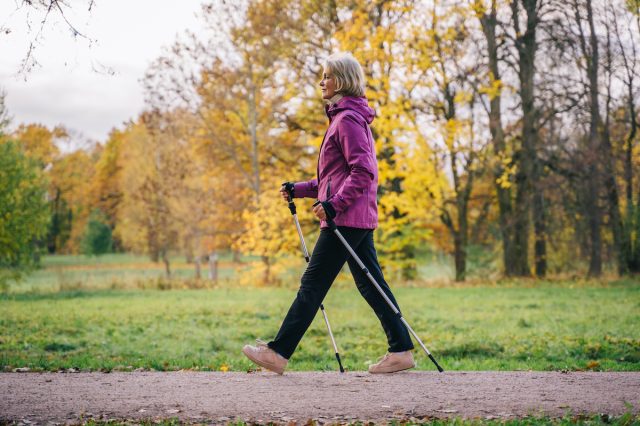If You're Over 60, Exercising Offers This Major Benefit For Your Brain

The brain may benefit from exercise just as much as the body, according to fascinating new research. These findings are notable for everyone, but hold particular weight for older adults. The scientists who conducted this recent study report habitual physical activity can help keep the brain sharp and young. (In other words, if you're over the age of 60 and want to retain sharp thinking skills for years to come, be sure to keep your body moving!)
This groundbreaking research confirms for the first time that more exercise increases levels of a specific protein in the brain. Why is that so noteworthy, might you ask? Well, that protein just so happens to support and enhance connections between neurons in the mind.
"Our work is the first that uses human data to show that synaptic protein regulation is related to physical activity and may drive the beneficial cognitive outcomes we see," says lead study author and an assistant professor of neurology, Kaitlin Casaletto, PhD.
The effect of exercise on cognition was even observed in people showing serious signs of dementia and Alzheimer's. This indicates that everyone can benefit from more exercise. Read on to learn more. And next, don't miss Secret Tricks for Getting a Fitter Body After 60, According to Science.
An active body makes for an active, sharp mind

In this initiative, a group of elderly subjects agreed to have their physical activity levels monitored, and they donated their brains to the research after passing away. An analysis of those brain samples revealed that older individuals who maintained a high level of physical activity displayed more of a specific brain protein that helps facilitate information exchange among neurons. Importantly, prior research conducted by the same team previously found that people with more of these proteins show stronger cognition and thinking skills late in life.
"Maintaining the integrity of these connections between neurons may be vital to fending off dementia, since the synapse is really the site where cognition happens," Dr. Casaletto says. "Physical activity—a readily available tool—may help boost this synaptic functioning."
Related: Sign up for our newsletter for the latest Mind + Body news!
The benefits of physical activity extend beyond memory

Plenty of prior research tells us that exercise has a positive impact on the hippocampus, which is the area of the brain responsible for memory. To even the study authors' surprise, however, these findings indicate that staying active strengthens far more than just the memory. Further brain regions associated with overall cognition and thinking abilities also showed stronger synaptic transmission among more active subjects.
"It may be that physical activity exerts a global sustaining effect, supporting and stimulating healthy function of proteins that facilitate synaptic transmission throughout the brain," comments senior study author William Honer, MD, a professor of psychiatry at the University of British Columbia.
Related: The #1 Way to Stop Memory Loss, Say Experts
Staying active could naturally prevent your chance of developing dementia

The deterioration of neurons and synapses is a telltale sign of dementia. Such developments usually occur after the buildup of both tau and amyloid on the brain, which are considered harmful proteins. Well, other research conducted by the same team says that stronger synaptic connections in the mind help offset the effect of these toxic brain proteins. So, even if an individual is at risk of getting Alzheimer's due to a buildup of tau and amyloid, exercise can still help preserve strong thinking skills and help prevent the onset of dementia.
"In older adults with higher levels of the proteins associated with synaptic integrity, this cascade of neurotoxicity that leads to Alzheimer's disease appears to be attenuated," Dr. Casaletto concludes. "Taken together, these two studies show the potential importance of maintaining synaptic health to support the brain against Alzheimer's disease."
Getting some moderate exercise in the morning is key

If you're looking for a new way to incorporate more movement into your daily schedule, consider going for a quick walk each morning. The fresh air and getting active will make you feel amazing.
In fact, this study, published in the British Journal of Sports Medicine, reports that some moderate exercise (such as a leisurely stroll) in the AM provides a major brain boost for older adults. After getting in a morning workout, participants had stronger memory skills and clearer thoughts in general for the remainder of the day.
For more, check out The 6 Best Winter Workout Items to Stay Warm, According to Runners.








